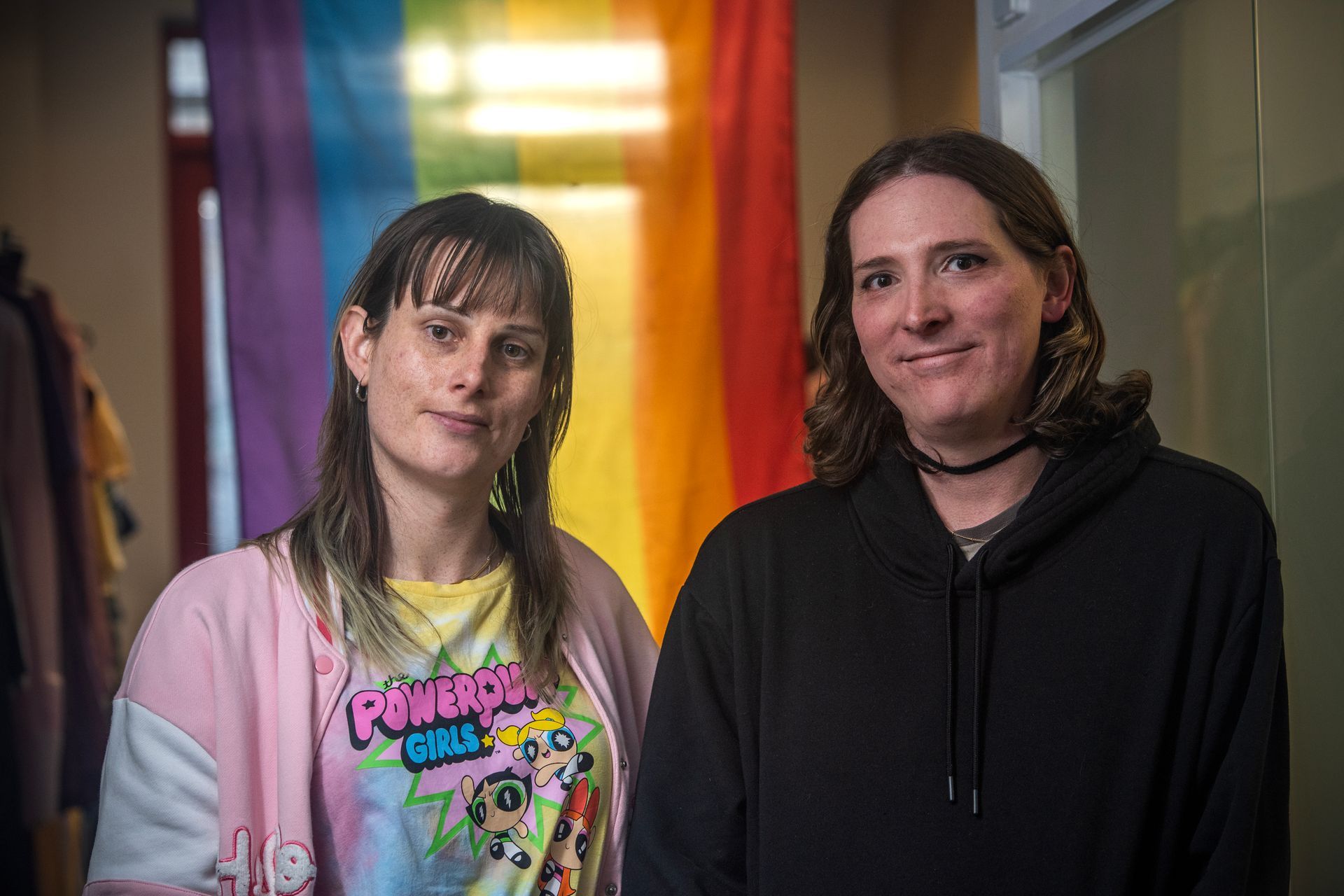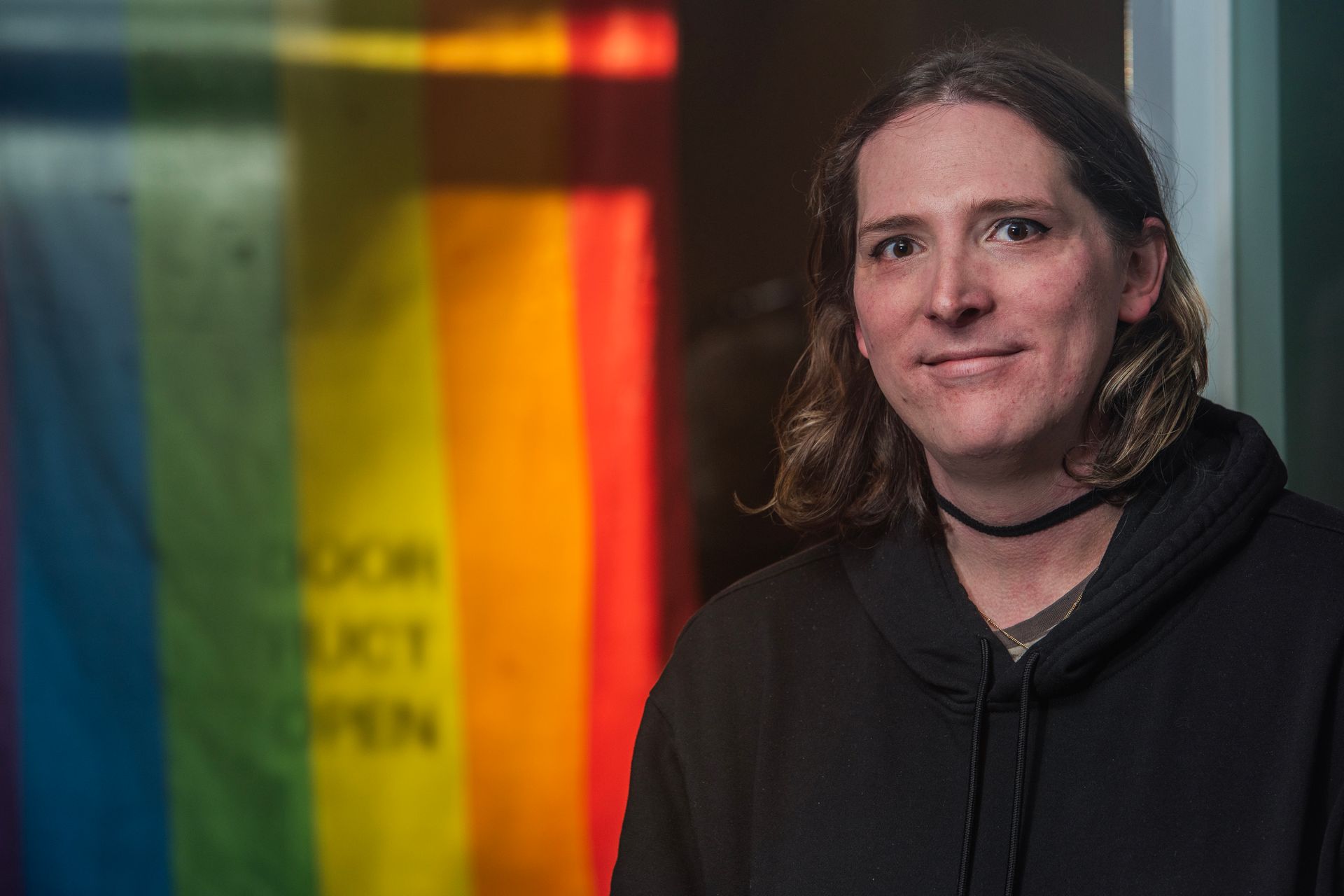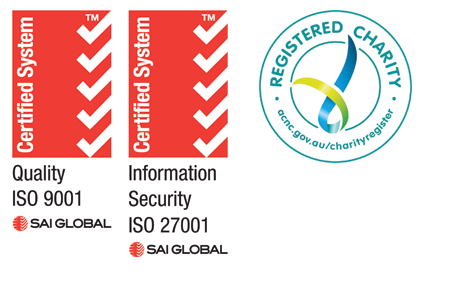Transforming LGBTIQA+ lives through mentoring
By Mary-Anne Toy

Pictured: Jade Barber (L), who manages the LGBTIQA+ mentoring project and Elle, participant. (Image credit: Mike Keating)
It seems such an obvious idea now that it’s been operating successfully for several years: provide trained mentors to support LGBTIQA+ people in the early stages of their identity journey as they become fully themselves.
Drummond Street Services’ LGBTIQA+ mentoring project was critical in helping Elle gain the confidence to be herself in the real world.
The project offers community-driven peer support and group engagement for LGBTIQA+ individuals, as well as their families of origin or choice.
Participants are matched with a volunteer mentor, receiving tailored support during vulnerable times, such as coming out or gender transition, and engaging in community-driven programs.
When Elle first signed on as a mentee, she had spent years online reading, listening and watching other people’s stories of navigating their gender identities. While that helped her understand why she felt her male birth classification didn’t reflect who she was, she lacked the confidence to do more. She felt isolated and stuck.
“I didn't know any queer people, didn't really have any queer people in my life, in my social circle,’’ she said.
“I knew a lot more about myself now because of the stories I saw online online, but I didn't know how to go about actually meeting people in person and building those social connections. It was a really difficult phase.”
Elle began seeing a therapist who referred her to the mentorship program, which is delivered by Drummond Street’s Queerspace – an LGBTIQA+ health and wellbeing support service.
She had been keen to attend LGBTIQA+ meet-ups, where people gather to share stories and experiences. For a year she would add events to her calendar, but then cancel at the last minute.
“My mentor ended up going to one or two meet-ups with me and she introduced me to some of her friends as well,” she said.
“And it was really good. Having somebody else to talk to who had some similar experiences and was a bit further along in their journey as well I found really helpful.’’
Building confidence to talk
When Elle was struggling with telling her parents that the son they’d raised was now a daughter, her mentor’s own experience gave her the confidence to do it and the realisation that it was better to do it sooner rather than later.
Elle, fearing rejection, was going to put off telling her parents until she had transitioned. Hearing her mentor’s experience of telling her own parent changed her mind. While both were aware that her mentor’s personal experience “isn't necessarily going to map onto to mine,” she said, “it was really helpful”.
Elle’s mentor had delayed telling her mum until she had already begun transitioning. That was the start of her mum’s perception of the journey, but the mentor was already way, way ahead because she had already been taking hormones and had booked surgery.
“To her mum it seemed like all these changes were happening really, really fast. And it was actually quite difficult and caused a lot of conflict,” Elle said.
In hindsight, the mentor realised that it would have been easier for her mum to adjust if she had told her before starting hormones and undergoing the bodily changes that resulted.
Hearing the story helped Elle realise something important.
“I didn’t have to have everything figured out before I tell them what's going on,” she said.
“I can just tell them where I'm at and we can just take it from there.”
Her parents were shocked and ask some hurtful questions. But her mentor was there to support her, and helped Elle realise that their reactions were coming from a foundation of love.
Jade Barber, who manages the LGBTQIA+ mentoring project, said the coordinators work hard to match mentors and mentees. It is uncommon for a mentor and mentee pairing not to work out.
“It's all in the prep, like most things,” she said.
“We spend time training, going through the screening, then we also spend time really getting to know the mentees, figuring out what risks are involved.
“Because we're matching someone with a volunteer, it's very important to make sure that they're in the right space, that there's not going to be risks that fall on them, the mentor.
“That's one of the biggest concerns. So that a volunteer doesn't find themselves having to take on the role of a professional having to intervene in a crisis.”
Mentors are given comprehensive training and coordinators are always there to support all participants.
“We try our hardest to make it work the first time,” said Jade, “because otherwise a mentee might be disappointed and then not have the energy to try again.’’

Pictured: Elle, participant. (Image credit: Mike Keating)
The mentoring program builds on a solid foundation.
“We're standing on the shoulders of something that's fairly unique to the LGBTIQA+ community,” Jade explained.
“Informal peer support is intertwined in the community and people know how to do it.
“Connection is very important for minority populations in general, and queer people are no exception. Sometimes it can be harder to find your community when you're queer because you’re not always born into it, you don't always grow up in it.”
Jade said a lot of the issues of poorer mental health and higher suicide risk within the community could be solved through social connection “because of a lot of it has to do with isolation”.
“And when queer people don't see examples of themselves, that's when it's very difficult to take action,” she added.
“It's very difficult to make decisions. It's very difficult to see a future for yourself.
“It gives people that hope: okay this person’s done it so I can do it, even if it's in my own way. That's why it works as a suicide prevention program and that's why it works so well as a mental health program.”
However, when people are providing informal peer support, burn-out is common.
“That's why we're involved through the whole process with both parties,” Jade explained.
“We do case management to make sure that they have everything they need while they're being supported in this mentoring relationship.
“We're building people to be able to provide that support in a safe way that's not going to burn them out.
“This is also building future community leaders and teaching them how to be supportive of people in that community and just providing those extra skills on top of the innate ones that exist. “
Fun and games
Like Elle, Mitchell heard about the mentoring program through a counsellor they trusted. Mitchell didn’t have any preferences in terms of gender or sexuality for their counsellor.
Mitchell struggles with gender dysphoria – the distress felt when sex assigned at birth doesn’t match their life experience.
“It didn’t have to be a trans person, I just need someone to talk to,’’ they said.
Mitchell’s mentor Karla said Mitchell requested someone who liked playing video games and that was their point of bonding. They meet monthly at a cafe or for a walk and may text-chat in between.
For Mitchell, having Karla there to talk to about dysphoria and related issues alleviated a lot of the stress and helped them manage their “emotional baseline”.
“Karla is very friendly, kind, not judgmental in the slightest and doesn’t make assumptions or pushes boundaries,’’ they said. “She always listens, always takes me very seriously.’’
Karla had heard about the Queerspace program and applied to be a mentor when she was still studying. Now a mental health counsellor, she finds it gives her an opportunity to help people in a different way to her day job.
Karla said she has had trans mentees before.
“I’m always really surprised me how much I have been able to help people across the identify divide,’’ she said.
She said Mitch only wanting to meet up monthly suited her current capacity and there was enough in common for them to build up rapport.
“Two-thirds of the time we’re talking about and processing those questions about gender, coming out... it’s nice to titrate that with silly sword games,’’ she said.
“That’s one of the benefits of the program matching personalities. It gives people the scaffolding to talk about this stuff that’s easy to avoid, gives you an appointment with yourself, supported by the other person, to process this stuff.”
Karla said the Drummond Street Services staff provided great support while allowing mentors and mentees autonomy.
“It’s very collaborative and they’re always checking in,” she explained. “There’s a lot of flexibility. It is very impressive.’’
She said she was surprised by how much she got out of the program.
“Going into this role I wanted to give back and that in itself is satisfying, but how much it’s helped me be more engaged in the community and how good it felt, how much I’ve got out of it was really surprising,” she said.
From mentee to mentor
For Elle, being a mentee has helped her live her life on her terms. Now she is training to become a mentor to help someone else do the same.
It started at an event put on by Transgender Victoria.
“There was a young kid who was really shy and introverted,” she explained. “Once we started getting into the activities, I started to see them coming out of their shell a little bit.
“I was remembering how I felt when I was really shy, first going to those meet-ups.
“So I started intentionally engaging him in conversation when he looked at a little bit nervous or lost, and it just felt really fulfilling.’’
That encounter made Elle realise that she could help others: “I felt like: yeah, it would be really nice to give a bit of that help back to other people who might still be anxious or still be finding themselves.’’



